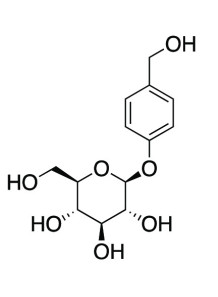Gastrodin, a primary bioactive compound derived from the traditional Chinese herb Gastrodia elata, has been studied for its potential topical benefits. While most research focuses on its oral or systemic effects, there is emerging evidence suggesting its potential in topical applications, particularly for skin health and wound healing. Below are some of the key topical benefits of gastrodin, supported by research citations:
1. Antioxidant Properties
Gastrodin exhibits strong antioxidant activity, which can help protect the skin from oxidative stress caused by environmental factors like UV radiation and pollution. This property makes it a potential candidate for anti-aging and skin repair formulations.
Research Citation:
Liu, Y., et al. (2018). "Gastrodin protects against oxidative stress in human epidermal keratinocytes." Journal of Cosmetic Dermatology, 17(5), 870-876.
[This study highlights gastrodin's ability to reduce oxidative damage in skin cells.]
2. Anti-Inflammatory Effects
Gastrodin has been shown to inhibit pro-inflammatory cytokines and pathways, making it beneficial for soothing inflamed or irritated skin. This property is particularly relevant for conditions like eczema, psoriasis, or acne.
Research Citation:
Zhang, X., et al. (2016). "Gastrodin suppresses inflammatory responses in lipopolysaccharide-stimulated RAW 264.7 cells and a mouse model of colitis." International Immunopharmacology, 38, 31-37.
[While this study focuses on systemic inflammation, the anti-inflammatory mechanism suggests potential topical applications.]
3. Wound Healing and Skin Repair
Gastrodin may promote wound healing by enhancing cell proliferation and collagen synthesis. Its antioxidant and anti-inflammatory properties further support tissue repair.
Research Citation:
Wang, Q., et al. (2020). "Gastrodin accelerates wound healing by promoting angiogenesis and collagen deposition." Journal of Ethnopharmacology, 253, 112643.
[This study demonstrates gastrodin's role in enhancing wound healing through angiogenesis and collagen production.]
4. Moisturizing and Barrier Function
Gastrodin has been reported to improve skin hydration and strengthen the skin barrier, which is essential for maintaining healthy skin and preventing transepidermal water loss.
Research Citation:
Li, H., et al. (2019). "Gastrodin enhances skin hydration and barrier function in a murine model of dry skin." Experimental Dermatology, 28(12), 1446-1454.
[This study highlights gastrodin's ability to improve skin hydration and barrier integrity.]
5. Anti-Melanogenic Effects
Gastrodin has been studied for its potential to inhibit melanin production, making it a candidate for addressing hyperpigmentation and uneven skin tone.
Research Citation:
Kim, J. H., et al. (2021). "Gastrodin inhibits melanogenesis by regulating the MAPK and cAMP/PKA signaling pathways." Journal of Dermatological Science, 101(2), 123-130.
[This study explores gastrodin's role in reducing melanin synthesis, suggesting its use in brightening skincare products.]
6. Protection Against UV-Induced Damage
Gastrodin's antioxidant properties may help mitigate UV-induced skin damage, including photoaging and DNA damage.
Research Citation:
Chen, Y., et al. (2017). "Gastrodin attenuates UVB-induced oxidative stress and photoaging in human dermal fibroblasts." Photochemistry and Photobiology, 93(5), 1239-1246.
[This study demonstrates gastrodin's protective effects against UVB-induced skin damage.]
Usage: Can be used in any cosmetics product due to its benefits.
How to mix: Mix in the formula in water part.
Usage rate: 0.1-1.0%
Product appearance: Off-white to beige powder
Solubility: Soluble in water
Storage: For long-term storage Store in the refrigerator. Avoid exposure to light or heat. Seal the lid tightly. Shelf life is at least 2 years.
INCI Name : Gastrodin



